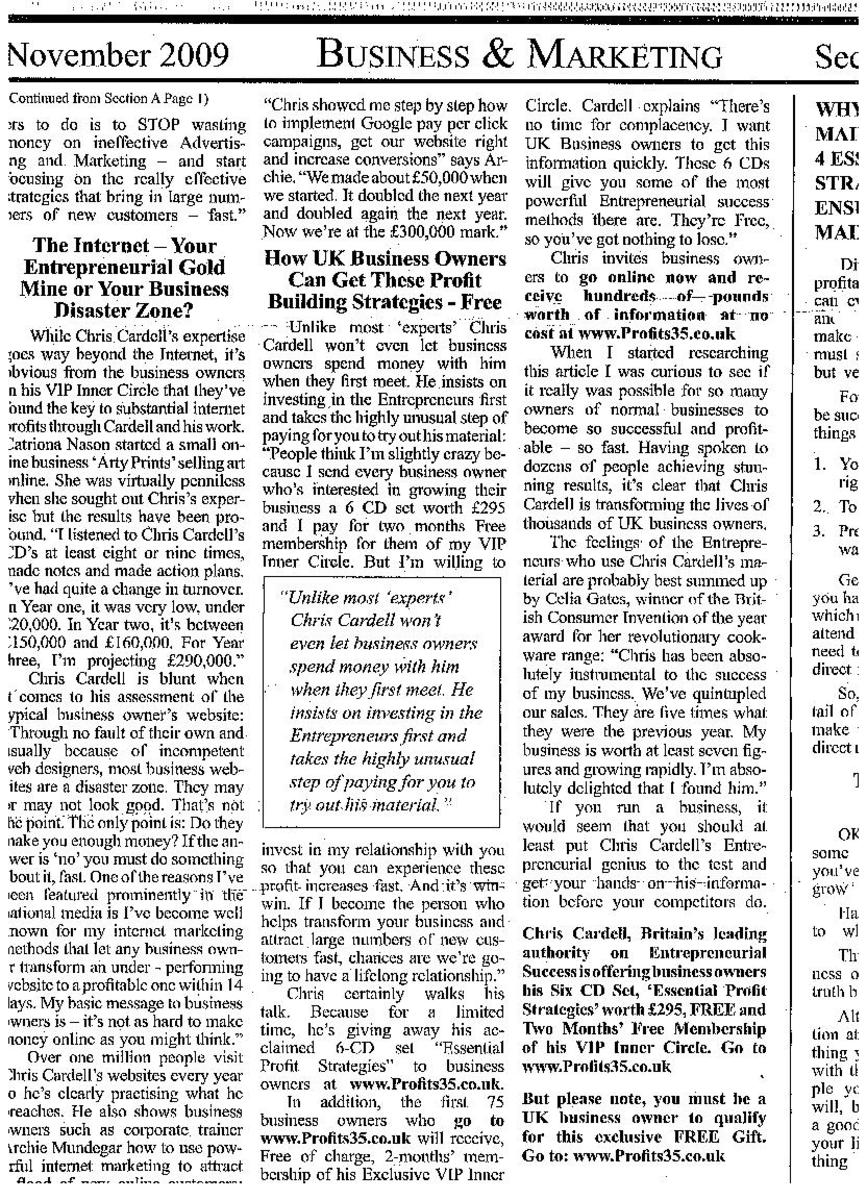Beginner's Guide to Article Marketing

When it comes to the Internet, information is king, and websites that rank high in the search engines capitalize on this idea by being information rich. To meet this demand, there are numerous websites, called article directories, which offer free articles to webmasters and business owners wishing to add valuable content to their websites. What makes this of particular interest to you, the internet marketer, is its capacity to not only act as a viral marketing tool but as an effective way to establish yourself as an expert in your field. Welcome to the world of article marketing.
The key, of course, in this kind of marketing is to offer information of great value. Very few things in life are able to garner positive attention than a gesture that says, “I want to give you an advantage—free of charge—which will radically improve your life.” It’s a very attractive gesture that grabs attention. And just as important as the type of information that you offer, is the manner in which you deliver it. More specifically, the keywords you use to convey your valuable information will make all the difference in how search engines rank your articles.
The Basics
First and foremost, regardless of what your article will be about, you’ll want to include your name, website URL, elevator pitch (a short but concise sales pitch), and a brief appeal for action. You might also wish to add you business contact information or the offer of a free newsletter. All this information will go into your “Resource” box.
Your articles need to offer a wealth of content and keywords, and this is much easier to do when you’re writing on subject matter that is second nature to you.
Getting Ideas for Articles
Finding the relevant subject matter to write about is easier than you may think. Several ways of accruing good topics to write about include:
- Searching local, national and global news media for ideas.
- Keeping a notepad in which to write new ideas as they occur to you.
- Searching the local library for books relevant to the business you are promoting.
- Creating a new habit of daily and weekly study of the subject matter relevant to your business, and writing out new ideas that emerge as a result of your daily study.
- Paying attention to the kinds of questions that you and others in your field receive on a regular basis. These questions will act as good indicators of the general themes many people are interested in knowing more about.
- Putting surveys on your site which encourage others to leave feedback about the topics are they are most interested in.
- Writing Top 10 lists.
- Writing step-by-step instructions for simple tasks relevant to your subject or business.
The Importance of Backlinks
What makes article marketing particularly effective is the potential of having many different sites pick up the same article. Every time this happens, the search engines eventually “spider” the website again and record the links you have left for your website. This in turn creates a backlink, which is simply a link to your site that appears on another site.
Now, pay attention here, because this is very important: With each additional backlink that a search engine collects, it ranks your site a little bit higher in relevant search results. Simply put, for every backlink to your site collected by a search engine, it will in turn interpret this to mean that your site is popular and important in the public eye; hence, the higher ranking.
However, it’s good to be aware of quality here. If your site link is found on thousands of sites, it could well be regarded as a “junk” link. Like anything else, when something becomes incredibly numerous, it can be seen as “a dime a dozen.” As such, do yourself a favor and submit only to the top 20 or 30 article directories.
Article Marketing as a Virus
Additionally, you have the potential of having many people read your articles and tell their friends about your article. The trick here is to create a genuine sense of expectation and excitement in your article. By doing so, more websites will pick up the article and more readers will have the chance to read it. And after having read it, if your article has generated the necessary buzz, you can be sure that your readers will relay the message in conversations, blogs and social networking sites.
Writing and Productivity
You might be saying, “Wait a minute! I can’t write!” Don’t worry. All you have to do is write as though you’re having a conversation with someone. How would you tell your best friend about an exciting opportunity? How have you done so in the past? Simply imagine that conversation in your head and write it out. It’s that simple.
Don’t worry about getting the words and sentences exactly right the first time. Just write everything out first, in the same way that you would speak it in an excited conversation. You can always go back and edit it later. The key is simply to begin the writing process and express your primary ideas in the fullest way possible. In brainstorming theory, it is considered important to have the freedom to express your most creative ideas first, without the fear of making mistakes or being reprimanded for them. By giving your self the freedom to write without inhibition, you’ll be giving yourself permission not only to be creative but playful as well.
Create an optimal schedule for how many articles you prefer to write every week, and stick with it. Be realistic by considering your time constraints. You will best be able to keep to your new schedule if you commit to writing articles that hold the greatest interest for you. Let’s face it: Passion rules. Think about it. If you’re excited about getting to express new ideas that fascinate you as share them in way that will positively affect others, aren’t you going to be less likely to procrastinate and make excuses? Absolutely. Plus, with your added commitment to writing from your passion, you’ll be more likely to win the enthusiastic interest of others.
Recycle Your Writing
If you’ve already written a manual, book or short program, you can easily split up chapters, with minor adjustments, to create multiple articles. You can also scan your blog, social networking sites, emails and discussion forums to find interesting subjects you’ve already written about. This is a great way to get more useful mileage out of your work. Just because you’ve written one piece does not mean that it can only be used in one place.
Another great method for recycling your work is to go through your previous articles and find sub-ideas that were only mentioned briefly and not expanded upon. You can always use some of your existing print to re-introduce the sub-idea, and then use the momentum of any previous experience you may have with the subject to quickly write a new article. Additional research can be conducted later to complete it for publication.
By working smarter than harder, you’ll save yourself time, energy and ultimately money. Be smart and recycle. You’ll be glad you did.
Article Directories
Once you have finished your article, you’ll want to submit to highly trafficked article directories. Lesser trafficked sites will never produce the results that higher ranked sites can produce. The Top 21 sites with the highest Alexa and Google ratings are:
1. EzineArticles
2. GoArticles
3. WebProNews
4. ArticleDashboard
5. SearchWarp
6. PubsACS
7. ArticleBase
8. Isnare
9. Buzzle
10. ArticleCity
11. IdeaMarketers
12. Site Reference
13. Article Alley
14. Web Source
15. Amazines
16. Submit Your Article
17. TheWhir
18. Excellent Guide
19. Directory Gold
20. Articles Factory
21. SelfGrowth
Be sure to place your articles in their proper categories. It’s a good habit to take the reader’s perspective and imagine how she would look for the content found in your article. By doing this, you can make it easier for the people who want your content to find your article.
Dou yourself a favor and stay away from the software applications that claim to submit your articles to hundreds of directories. First, as mentioned earlier, having your site on hundreds of directories will actually decrease your ranking, because its value is lessoned through mass production. Secondly, the search engines dislike such software, and they may reprimand you for such use.
Hiring Out
What if you like the idea of article marketing but aren’t interested in doing the writing yourself? Hire someone else to do the writing for you. There are numerous ghostwriting services and article marketing services that will look at the subject matter of your website and create content-rich articles that are strategically optimized for search engine rankings.
These services are businesses specifically designed to help you make the most of your article marketing endeavors. Depending on your budget and the nature of your business, this could well be your best option, as the companies have well developed avenues of communication with established publishers. The best of these services deliver your articles not only to article directories but to magazine publishers as well.
- 95 Free Article Submission Websites - Article Market...
Interested in promoting your website? Have you considered Article Marketing? Article Marketing is a great way to promote your website, blog or e-zine. With Article Marketing You Have 3... - Article Marketing Riches
The Basics of Article Marketing Article marketing is one of the best ways of drawing your target market to your website and convincing them that you are the best company for the job. But what exactly is... - Article Marketing Rules
Will a human eye ever see your article? The most important thing not to do in article marketing is to chase links. Google is more interested in quality than quantity of links. So submitting to a hundred... - Internet Article Marketing Strategy Unleashing t...
Using article directories as the foundation of an internet article marketing strategy is sound business practice. Good quality articles can work for you, creating backlinks and increasing your reach with little extra effort. This guide shows you how - The Ultimate Article Marketing Strategy To Drive Mas...
Developing an article marketing strategy is fundamental to your success no matter how good your writing might be (contrary to what many writers would like to believe)and getting traffic to your website is the... - Article Marketing Automation Which Actually Works!
Article Marketing Automation is a new service which publishes your articles, complete with links to blogs which are focussed on your article's topic. Powerful and new this product has me really excited for the possibilities of developing new blogs an








